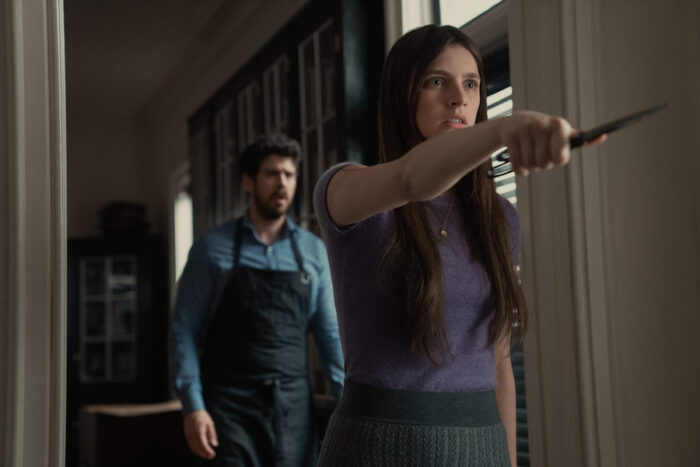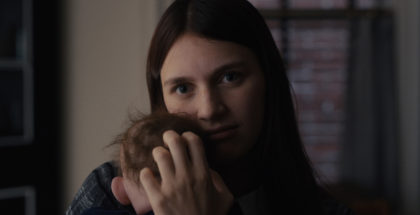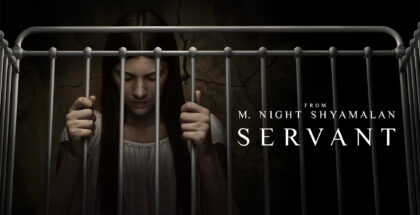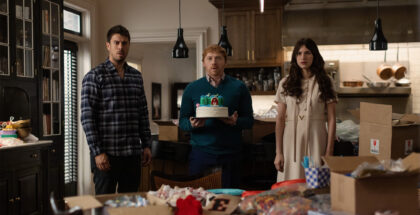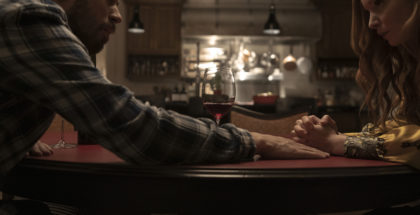First look UK TV review: Servant Season 3
Review Overview
Fear
8Freak-outs
8Focus
8David Farnor | On 21, Jan 2022
Season 3 premieres on Friday 21st January, with episodes arriving weekly. Warning: This contains spoilers for Season 1 and 2. Never seen Servant? Read our spoiler-review of Season 1 here.
Weird. Strange. Odd. Unusual. All of these words could be used to describe Servant, Tony Basgallop’s bizarre psychological thriller. Frustrating and uneven also joined the list in Season 2, as what began as an enjoyably unsettling chamber piece started to get carried away with its own absurdity. Opening up into a wider story about cults and control, it lurched from nightmarishly impossible ideas to inexplicable confrontations without time for logic. Season 3 is something of a return to form, reigning in the madness and finding a sense of shrewd, renewed focus.
We pick things up several months after the climax of Season 2, which saw Dorothy and Sean Turner (Lauren Ambrose and Toby Kebbell) surprised by the return of Jericho, their baby who disappeared. Of course, we now know that Jericho could never return, after he died in a tragic accident between Sean and Dorothy’s brother, Julian (Rupert Grint) – a situation that was made worse by the arrival of sinister nanny Leanne (Nell Tiger Free), who encouraged Dorothy’s denial, as she believed that a therapy doll was her living baby, to the point where the doll seemed to come alive. That surreptitious swap opened up the world of Leanne’s past, as we learn that she has escaped a mysterious religious sect – whose representatives turned up on Sean and Dorothy’s doorstep in Season 2, leading to a kidnapping and even more supernatural shenanigans. “Jericho” was spirited back once more in the finale, but nothing felt like it had been resolved or clarified.
Season 3 makes a concerted decision to move past that limbo and start to piece together the pieces of the story – and, smartly, this happens at the same time, and is driven by, the characters also trying to move on with their lives. The weirdness and terror, then, comes less from arbitrary strangeness and more from people having to confront and acknowledge their trauma.
Dorothy, needless to say, is the person with the most daunting trauma to face, and Lauren Ambrose’s performance remains the core of the show, which delicately delves with the way that we can construct realities and rationalities for ourselves to process grief and loss. But Season 3 deftly shifts emphasis, ever so slightly, so that Leanne’s trauma becomes the main engine pushing the narrative forwards: it’s telling that Dorothy and Sean actually go outside the flat, and that we join in the outside world, for the first time, and the directing team (led once again by M Night Shyamalan) do a brilliant job of contrasting the bright, wholesome daylight with the shadowy interiors of their twisting, tomb-like house.
Leanne, equally tellingly, remains indoors as she worries about the cult members tracking her down once again – even the installation of CCTV cameras around the house only reinforces the sense of claustrophobic uncertainty, rather than instil a feeling of security, and Tony Kebbell is superb at playing the optimistic, polite counterpart to Ambrose’s compassionate Dorothy. Both are supportive and patient with Leanne, but hideously self-centred, to the point where even the way the proud chef Sean offers sandwiches to teens sleeping rough in the nearby park lacks any awareness of other people.
What ensues is a fantastic, nerve-jangling juxtaposition of suburban normality and flashes of panic, with the privileged circle of moms and babies that Dorothy is keen to rejoin interrupted by bursts of something darker. Played straight by the cast, and anchored in a heartfelt, fragile turn by Nell Tiger Free – who could almost be the tale’s innocent hero this whole time – it’s as moving as it is creepy, almost like someone is playing the soundtrack to The Shining over your favourite American sitcom.
The pacing is handled with just the right mix of patience and pernicious paranoia, letting things simmer without getting stale and avoiding them bubbling over into ludicrousness – once the dialogue starts to involve a kids’ entertainer, it’s as darkly amusing as it is unnerving. Rupert Grint, meanwhile gets more to do than just be sleazy as Julian, with a new romantic interest for him opening up room for the truth to begin to squirm its way out. The result is a sharply scripted slice of psychological horror, finely attuned to its characters’ thoughts and feelings, that leaves you once again immersed in the mystery at hand. It’s weird, strange, odd, unusual – and you can’t shake the suspicion it’s got the audience exactly what it wants.


